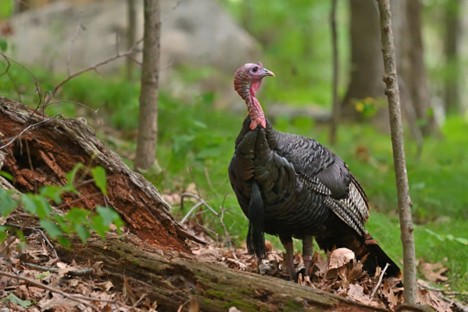Safety Tips For The Spring Turkey Season
Hunters and public land users may be sharing fields and forests during the season and need to be aware and alert of others in their area. / Photo Credit: iStock/Robert Winkler
At long last, it’s turkey time in Wisconsin!
As the weather warms, plenty of outdoor enthusiasts will be enjoying Wisconsin’s abundant natural resources. That means turkey hunters and public land users may be sharing fields and forests during the season and need to be aware and alert of others in their area.
Hunters should follow safety rules, and non-hunters enjoying public lands should consider wearing blaze orange or other high-visibility clothing.
Hunter camouflage is an important part of hunting turkey, but it may also present a problem. The better camouflaged and concealed you are, the less likely another hunter will be able to see you.
At the same time, wearing the wrong colors, like red, white or blue, can also put turkey hunters at risk. If a fellow hunter sees a flash of those colors through the brush, you could be mistaken for a turkey.
To dress for success and safety, follow these tips from the National Wild Turkey Federation:
- Be sure that accessories you carry that are red, white, or blue (decoys, diaphragm calls, box call chalk, candy wrappers, apples, cigarette packs, etc.) are not visible to other hunters.
- Do not “over-camouflage” by sitting in vegetation so thick that it obscures your vision.
- If you use a human-made blind or camouflage netting, maintain a clear field of view.
For more information on turkey hunting, visit the DNR’s Turkey Hunting webpage.
Planet Vs. Plastics: What’s Recyclable And What’s not
Monday, April 22 is Earth Day! This year’s theme is Planet vs. Plastics.
Plastics are all around us, and only certain types can be recycled into new materials. Figuring out which plastics can be recycled and how to do it can be confusing. We’d like to help.
Consider these tips:
1. Look for the resin code. Many plastic products are stamped with a standardized code to help identify the type of plastic it is. The resin code (#1-7) is usually found on the bottom of a container.
2. Recycle #1 and #2 plastic bottles and jugs. Wisconsin’s recycling law bans these containers from landfills and ensures every recycling program accepts them.
3. Check with your local recycling program if additional plastics #3-7 are accepted in your recycling bin.
4. When in doubt, throw it out. Undesirable plastics contaminate the recycling stream and add labor and operation costs for your local recycler.
5. Look for alternative recycling options. Plastics that can’t go in your recycling bin, like plastic bags and film, may be accepted at a local drop-off location.
More information on the different types of plastic, their common forms and how to recycle them are found on the DNR’s What to Recycle in Wisconsin webpage.
Photo Credit: iStock/spwidoff |
Native Plants Sales Are Popping Up!
By planting native plants, you can provide food for insects, birds, small mammals and other wildlife. As an added bonus, native plants are a beautiful alternative to sometimes invasive garden plants. They come in a wide variety of colors, shapes and sizes, giving you endless options to create beautiful landscaping that suits your style.
Dig into our list of this year’s native plant sales across the state, and start flexing your green thumbs today!
Pre-Order Sales
Drop-In Sales
In addition to these great local sales, be sure to check out our list of nurseries offering native plants in Wisconsin.
Photo Credit: Wisconsin DNR |
Pack Your Angling Essentials This Spring
It won’t be long now until Wisconsin’s 2024 general inland fishing season opens on May 4.
If you’re looking to try fishing for the first time and need tackle box tips, or if you haven’t been fishing in a while and need a refresher, the spring issue of Wisconsin Natural Resources magazine has the information you need.
“Tackling the tackle box essentials” covers how to stock your basic tackle box so you can get out and go fish. Now’s a good time to get organized to be sure you’re ready when the fish start to bite! To get the spring issue delivered to you, renew your subscription or give a gift to someone else, you can sign up online or call 1-800-678-9472 today.
The DNR’s fishing website has all the resources you need no matter if you’re fishing for the first time or an old pro! From license information to rules and regulations to places to try your luck on the water, we’ve got you covered.
|
|
